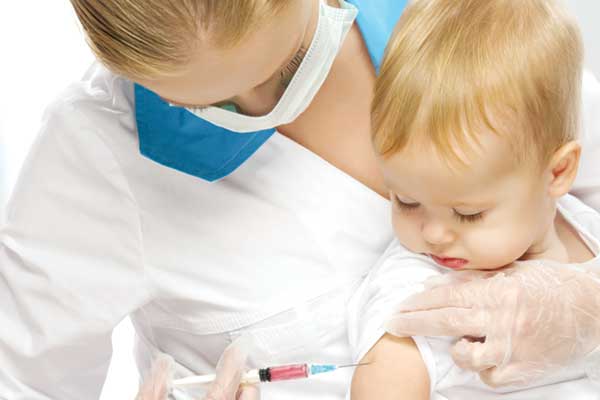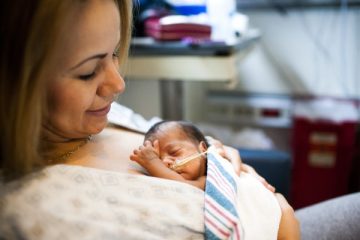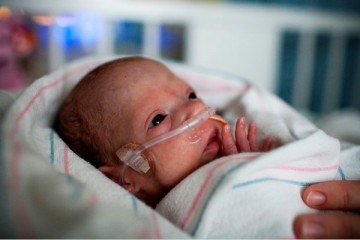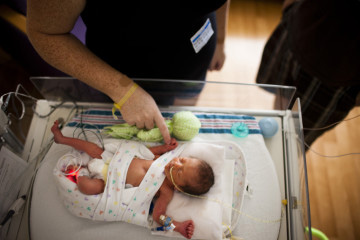Respiratory Syncytial Virus (RSV)
What is respiratory syncytial virus (RSV)?
RSV is the most common cause of bronchiolitis (inflammation of the small airways in the lungs) and pneumonia in babies. It is an illness that often occurs in yearly outbreaks in communities, school classrooms, and day care centers. In the United States, RSV is more common in winter and early spring months. Learn more about the CHOC RSV Prevention Program .
What causes respiratory syncytial virus (RSV)?
RSV is spread from respiratory secretions through close contact with infected people or contact with contaminated surfaces or objects. Infection can occur when infectious material contacts mucous membranes of the eyes, mouth, or nose, and possibly through the inhalation of droplets generated by a sneeze or cough. The incubation period (time from exposure to symptoms) is about 2 to 5 days.
Who is affected by respiratory syncytial virus (RSV)?
RSV can affect a person of any age, although severe symptoms usually only occur in very young infants. Most babies have been infected at least once by the time they are 2 years old. Babies can also be re-infected with the virus. Recurrence throughout life is common. Babies born prematurely or with heart, lung or immune system diseases are at increased risk of developing more severe illness.
Why is respiratory syncytial virus (RSV) a concern?
In babies at increased risk, infection with the virus can lead to severe respiratory illness and pneumonia, and may become life-threatening. RSV in infancy may be related to development of asthma later in childhood.
What are the symptoms of respiratory syncytial virus (RSV)?
The early phase of RSV in infants and young children is often mild, somewhat like a cold. In children younger than 3, the disease may progress into the lower airways and cause coughing and wheezing. In some, the infection progresses to a severe respiratory disease requiring hospitalization to help the child breathe.
The following are the most common symptoms of RSV. However, each baby may experience symptoms differently. Symptoms may include:
- Runny nose
- Fever
- Cough
- Apnea (periods without breathing)
- Trouble eating, drinking, or swallowing
- Wheezing
- Flaring of the nostrils or straining of the chest or stomach while breathing
- Breathing faster than usual, or trouble breathing
- Turning blue around the lips and fingertips
The symptoms of RSV may resemble other conditions or medical problems. Always consult your baby’s doctor for a diagnosis.
How is respiratory syncytial virus (RSV) diagnosed?
Diagnosis is sometimes difficult because the symptoms of RSV can resemble other infections. Illness in other family members, other babies in the hospital nursery, or the time of year may provide clues. In addition to a complete medical history and physical examination of your child, a test (nasal swab or nasal wash) of the baby’s respiratory secretions may show the presence of a virus.
What is the treatment for respiratory syncytial virus (RSV)?
Specific treatment for RSV will be determined by your baby’s doctor based on:
- Your baby’s age, overall health, and medical history
- The extent of the condition
- Your baby’s tolerance for specific medications, procedures, or therapies
There are no medications used to treat the virus itself. Care of a baby with RSV involves treating the effects of the virus on the respiratory system. Because a virus causes the illness, antibiotics are not useful, unless there is also a bacterial infection. Treatment may include:
- Supplemental oxygen
- Breathing treatments
- Suctioning of mucus
- Intravenous fluids (to prevent dehydration)
- Tube feedings (if the baby has difficulty sucking)
Children with very serious breathing problems are intubated and put on ventilators (breathing tubes are inserted and attached to machines that assist with breathing).
How can respiratory syncytial virus (RSV) be prevented?
The American Academy of Pediatrics (AAP) recommends that babies at high risk for RSV receive a medication called palivizumab. Ask your child’s health care provider if your child is at high risk for RSV. If so, ask about monthly injections during RSV season to help prevent RSV.
To reduce the risk for RSV and other viral infections, the AAP recommends all infants, especially preterm infants, should avoid high-volume child care settings during their first winter season, and avoid contact with people who are sick. The AAP also recommends that other members of the household get a flu shot, and clean hands with alcohol-based hand
















